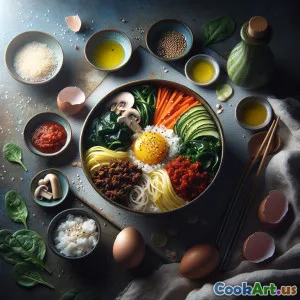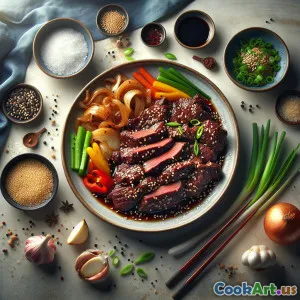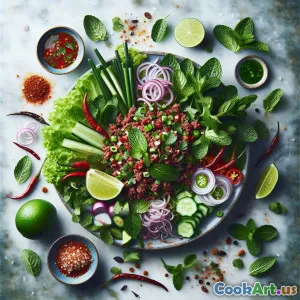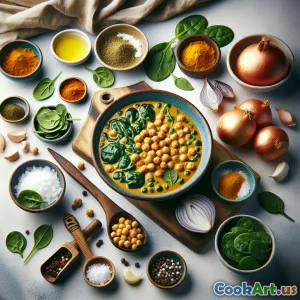
Вкусный Красочный Корейский Рецепт Бибимбапа
(Deliciously Colorful Korean Bibimbap Recipe)
(0 Обзоры)0
58
апрель 04, 2025
Сообщить о проблеме
Ингредиенты
-
2 cups Вареный Рис
(Use short-grain rice for best texture.)
-
1 cup Шпинат
(Blanched and chopped.)
-
1 medium Морковь
(Julienned.)
-
1 medium Цукини
(Julienned.)
-
1 cup Грибы
(Sliced (shiitake or button).)
-
150 grams Фарш
(Can substitute with tofu for vegetarian option.)
-
2 large Яйца
(Fried sunny-side-up.)
-
2 tbsp Gochujang
(Korean chili paste, adjust to taste.)
-
1 tbsp Кунжутное масло
(Для украшения.)
-
1 tbsp Семена кунжута
(Для украшения.)
(Use short-grain rice for best texture.)
(Blanched and chopped.)
(Julienned.)
(Julienned.)
(Sliced (shiitake or button).)
(Can substitute with tofu for vegetarian option.)
(Fried sunny-side-up.)
(Korean chili paste, adjust to taste.)
(Для украшения.)
(Для украшения.)
Питательная ценность
- Порции: 2
- Размер порции: 1 миска (350г)
- Calories: 600 kcal
- Carbohydrates: 80 g
- Protein: 25 g
- Fat: 20 g
- Fiber: 5 g
- Sugar: 6 g
- Sodium: 600 mg
- Cholesterol: 160 mg
- Calcium: 200 mg
- Iron: 3.5 mg
Инструкции
-
1 - Prepare Ingredients:
Wash and chop all vegetables. Blanch spinach and set aside.
-
2 - Cook Ground Beef:
In a skillet, cook ground beef over medium heat until browned. Season with salt and pepper.
-
3 - Sauté Vegetables:
In the same skillet, add carrots, zucchini, and mushrooms. Sauté until tender.
-
4 - Fry Eggs:
In a separate pan, fry eggs sunny-side-up until whites are set.
-
5 - Assemble Bibimbap:
In bowls, layer cooked rice, sautéed vegetables, ground beef, and top with fried egg.
-
6 - Serve:
Drizzle with gochujang and sesame oil. Sprinkle with sesame seeds. Mix before eating.
Wash and chop all vegetables. Blanch spinach and set aside.
In a skillet, cook ground beef over medium heat until browned. Season with salt and pepper.
In the same skillet, add carrots, zucchini, and mushrooms. Sauté until tender.
In a separate pan, fry eggs sunny-side-up until whites are set.
In bowls, layer cooked rice, sautéed vegetables, ground beef, and top with fried egg.
Drizzle with gochujang and sesame oil. Sprinkle with sesame seeds. Mix before eating.
Подробнее о: Вкусный Красочный Корейский Рецепт Бибимбапа
Bibimbap is a traditional Korean dish that translates to 'mixed rice.' This colorful dish is not only visually appealing but also packed with nutrients from a variety of vegetables and proteins. Originating from Korea, bibimbap was historically enjoyed as a way to utilize leftover ingredients, creating a perfect balance of flavors and textures. The vibrant array of ingredients typically includes sautéed vegetables such as carrots, zucchini, and mushrooms, along with a protein like beef or tofu. The addition of a fried egg on top adds creaminess, while gochujang provides a spicy kick. Bibimbap's cultural significance extends beyond its delicious taste; it represents harmony in food, reflecting the Korean value of balance. This dish is often enjoyed in a communal setting, where diners mix the ingredients together, symbolizing unity. For a personal touch, feel free to experiment with different vegetables or proteins based on your preferences. Enjoy this delightful dish that not only satisfies hunger but also brings a piece of Korea into your kitchen!
Оцените рецепт
Отзывы пользователей
Популярные рецепты


















